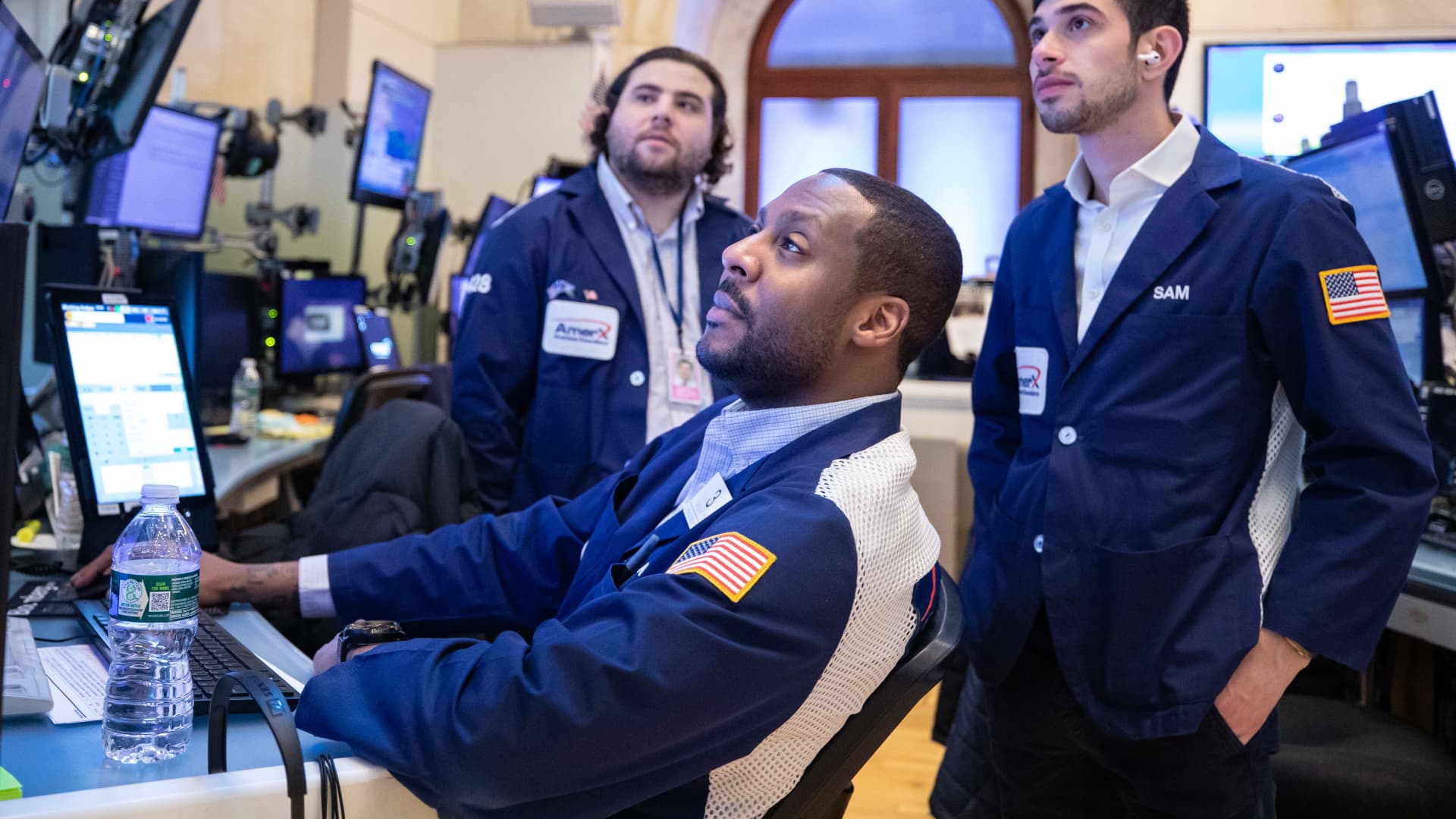Here are the most important news, trends and analysis that investors need to start their trading day:
1. Stocks set to rise, with Dow, S&P 500 on winning streaks
U.S. stock futures pointed to a higher open Tuesday and a fourth straight session of gains for both the Dow Jones Industrial Average and the S&P 500 and a back-to-back advance for the Nasdaq. Growing hope for a Russia-Ukraine ceasefire appeared to help investor sentiment.
- All three benchmarks turned losses intraday Monday into gains by the close.
- The Dow and S&P 500 were roughly 5% below their early January record closes.
- The Nasdaq, while clawing its way higher recently, was still in a correction, down more than 10% from its November 2021 record close.
Consumer confidence and home price data are set for release Tuesday, ahead of Friday’s March employment report, the last monthly jobs data from the government before the Federal Reserve’s next policy meeting in early May.
2. Yield curve inversion recession signal still flashing
The 5-year Treasury yield was still higher than the 30-year yield Tuesday morning, one day after doing so for the first time since 2006. This type of inversion has in the past happened before recessions. However, The main spread that traders watch — the 2-year Treasury yield and the benchmark 10-year yield — remained intact.
Treasurys
The 10-year yield was above 2.5% on Tuesday, still near a three-year high. The strength at the shorter end of the Treasury yield curves comes as the Fed is expected to get more aggressive with short-term interest rate hikes this year to fight inflation. Central bankers at their March meeting increased interest rates for the first time in more than three years.
3. Saudi energy minister says politics not part of oil decisions
Oil prices rose modestly Tuesday, trying to recover some of the previous session’s sharp losses. West Texas Intermediate crude, the U.S. benchmark, fell more than 8% on Monday as concerns over new Covid lockdowns in China and the potential for curtailed demand sent prices tumbling. Ahead of this week’s OPEC+ meeting, Saudi Arabia’s energy minister told CNBC on Tuesday that international producers will keep politics out of their decision-making in favor of the “common good” of stabilizing energy prices. OPEC+ has faced pressure to boost oil output with crude prices still around $100 per barrel in the wake of energy powerhouse Russia’s invasion of Ukraine.
4. Russian and Ukrainian delegates resume peace talks in Istanbul
Peace talks between Russian and Ukrainian delegates resumed in Istanbul on Tuesday. As negotiations began, three humanitarian corridors have been opened in Ukraine. Meanwhile, Deputy U.S. Treasury Secretary Wally Adeyemo told CNBC on Tuesday that America will hold accountable anyone seeking to help Russia bypass sanctions for its unprovoked attack on Ukraine. The war has triggered a humanitarian crisis, sent shock waves through financial markets and left Russia increasingly isolated on the global stage.
5. FedEx founder Fred Smith will step down as CEO
FedEx said late Monday that Fred Smith will step down on June 1 as CEO of the package delivery giant he founded. He’ll be succeeded by FedEx President and Chief Operating Officer Raj Subramaniam. Smith will become executive chairman. FedEx, which the 77-year-old founded, started operations in 1973 — and over the next half-century Smith oversaw the growth of a company that became an economic bellwether. FedEx shares, while down 11% in 2022, have gained nearly 130% since their Covid low of $88.69 on March 20, 2020. FedEx and rival United Parcel Service have both benefited in recent years from the boom in online shopping, which was accelerated during the pandemic.
— CNBC reporters Samantha Subin, Vicky McKeever, Pippa Stevens, Chloe Taylor and Sam Meredith as well as Reuters and The Associated Press contributed to this report.
— Sign up now for the CNBC Investing Club to follow Jim Cramer’s every stock move. Follow the broader market action like a pro on CNBC Pro.
